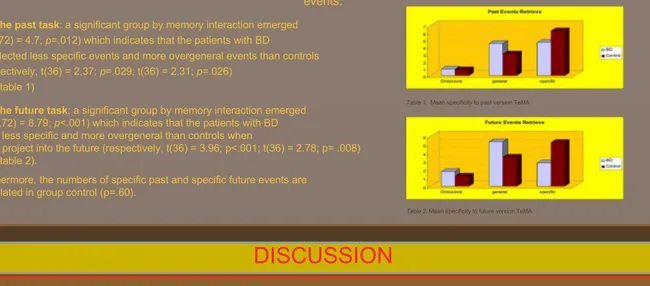Dependant measures
A validated French versions
(Neumann & Philippot, unpublished manuscript)of the AMT
(Williams & Broadbent, 1986).•
A past version:participants were asked to retrieve specific personal events in
response to ten cue words.•
A future version:participants were asked to generate specific personal events that
could occur to them in the future in response to ten cue words.PAST AND FUTURE EVENTS SPECIFICITY
PAST AND FUTURE EVENTS SPECIFICITY
IN BIPOLAR DISORDERS
IN BIPOLAR DISORDERS
Marie Boulanger, Aurélie Lejeune & Sylvie Blairy
University of Liege, Belgium
Bipolar disorder (BD) is accompanied by deficit in autobiographical memories (AM) (Scott & al., 2000; Mansell & Lam, 2004). In others words when these patients are instructed to recall a specific event distinctly located in time and place (e.g. The day where I failed my chemistry test in June) they recall an extended event (e.g. When I was University) or a category of repeated events (e.g. When I went to the cinema). Previous research showed that impairments in the recollection of specific past event are correlated to difficulties to generate specific future events in schizophrenia patients (D’Argembeau, Raffard and Van-der-Linden, 2008; Neumann, Blairy, Lecompte, Nachtergael and Philippot (unpublished)
.
For each task, past and future, a mixed design 2(group) x 3(memory type) ANOVA was conducted to the number of generated
events:
For the past task: a significant group by memory interaction emerged
(F(2,72) = 4.7; p=.012) which indicates that the patients with BD recollected less specific events and more overgeneral events than controls (respectively, t(36) = 2,37; p=.029; t(36) = 2.31; p=.026)
(see table 1)
For the future task: a significant group by memory interaction emerged
(F(2,72) = 8.79; p<.001) which indicates that the patients with BD were less specific and more overgeneral than controls when
they project into the future (respectively, t(36) = 3.96; p<.001; t(36) = 2.78; p= .008) (see table 2).
Furthermore, the numbers of specific past and specific future events are correlated in group control (ρ=.60).
The purpose of the present study was investigated the impairments in AM as well as the ability to generate specific future events in patients suffering from bipolar disorder.
To our knowledge, the present study is the first one to investigate the ability to generate past as well as specific future events in patients with bipolar disorders. The results are in line with the results of Scott & al., (2000) and Mansell & Lam (2004) and the results of previous studies with patients having an emotional disorders that is: AM performance in patients with BD is effectively impaired in comparison to healthy individuals for past as well as future events. The reduced capacities to generate personal specific life events is particularly clinically relevant. Indeed, according to Williams et al. (1996), difficulty in imagining the future may contribute to impairments in problem solving and to suicidal behaviors. Regarding the important role that plays the inability to imagine the future in suicidal ideations, more systematic measure of this ability should be taken in both research and clinical fields.
D’Argembeau, A., Raffard, S., & Van der Linden, M. (2008). Remembering the past and imagining the future in schizophrenia. Journal of Abnormal Psychology, 117(1), 247-251. Mansell, W., & Lam, D. (2004). A preliminary study of autobiographical memory in remitted bipolar and unipolar depression and the role of imagery in the specificity of memory. Memory, 12(4), 437-446.Neumann, A., & Philippot, P. (unpublished). Tâche d’Evaluation de la Mémoire Autobiographique : TeMA. Validation française de l’Autobiographical Memory Test. Neumann, Blairy, Lecompte, Nachtergael and Philippot (unpublished). Reduced specificity of autobiographical memory and personal projection in the future in schizophrenia. Scott, J., Stanton, B., Garland, A., & Ferrier, I.N. (2000). Cognitive vulnerability in patients with bipolar disorders. Psychological Medicine, 30, 467-472. Williams, Ellis, Tyers, Healy, Rose and MacLeod (1996). Yhe specificity of autobiographical memory and imageability of the future. Memory and cognition, 24, 116-125.
Table 1. Mean specificity to past versionTeMA
*Correspondence to adress to Marie Boulanger, Departement of Cognitive Science, University of Liège, Boulevard du Rectorat 3 (B33), 4000 Liège, Belgium. E-mail: marie.boulanger@ulg.ac.be
Participants
19 healthy subjectsnever had to present one or many depressive episode, manic episode or,
hypomanic episode. 19 patients fulfilled the DSM-IV
criteria for bipolar disorder (bipolar I or bipolar II).
METHOD
OBJECTIVE
INTRODUCTION
RESULTS
Table 2. Mean specificity to future version TeMA
